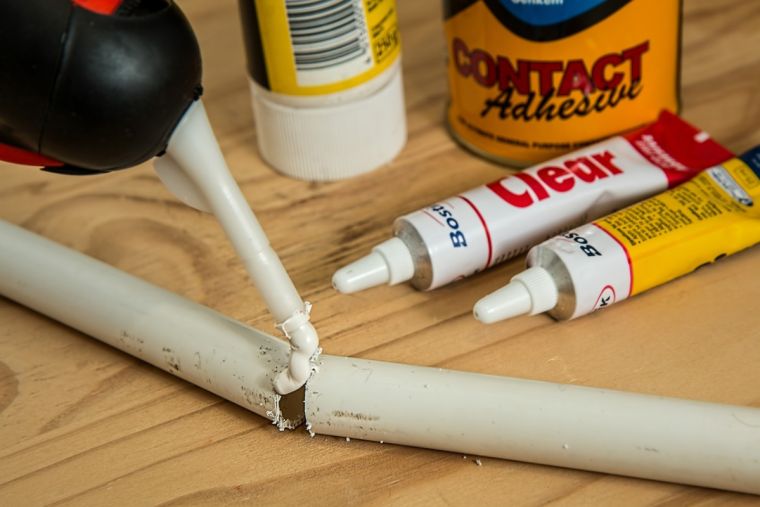God's glue: How the Bible teaches us to repair the world
The Jewish community is currently reading from Deuteronomy, the biblical book which recapitulates the history of the Jewish people up till now, as well as the way forward for future flourishing.
At the repetition of the 10 Commandments (better translated as 'The 10 utterances') read in shul last Shabbat, we are reminded not so much to 'remember' the Shabbat day as in the earlier Book of Exodus, but from now on to 'guard and preserve it'. In addition, we are enjoined to live a life faithful to G-d in all we do.

So last Shabbat's sermon discussed the Hebrew concept of 'd-v-k', utter adherence to G-d's ways. But what does 'utter adherence' mean exactly for daily life in Britain in 2018?
It is often useful when heeding a sermon based around a Hebrew word (in which vowels are additional extras and it's the consonants that matter) to look at how the word has developed in modern Hebrew.
Modern Hebrew is largely the brain-child of Eliezer ben Yehuda (1858-1922) of observant Lithuanian Jewish stock, who spent most of his adult life in Israel recreating, with others, the Hebrew language as we know it today, ready for use by the vast majority of Jews who, he correctly predicted, would one day in the not-too-distant future be returning to their homeland.
Working on the Hebrew language for use by the return of the exiles from the diaspora, he was encouraged by other prophetic characters, such as the great Rav Kook (1865-1935) who, in the year of Eliezer's death, was appointed as the first Chief Rabbi of Israel under the British Mandate.
Much of the brilliant and magical language of modern Hebrew, praised to the heights by Prince William on his recent visit as one of the glories of modern Israel, was created by people such as Eliezer and Rav Kook, who were steeped in knowledge of biblical, Mishnaic, Midrashic, Talmudic, medieval and later Hebrew developments, as well as in cognate Semitic languages and usages, such as Aramaic, Syriac and Arabic.
And in modern Hebrew, 'd-v-k' means 'glue'. If I asked my Israeli grand-daughter, who has just turned eight, what 'd-v-k' means, she wouldn't say 'adherence to G-d's ways', or even 'being a good person'. She would say 'That's what I use to stick things together so they don't come apart – and it's very messy, most of the time.'
It's the messiness of adhering to G-d's ways that is the clue to the glue. If it were easy, we wouldn't have sermons telling us how to behave. As Deuteronomy (30: 11-14) itself states as G-d's nearly final words to the Jewish people:
'For this commandment that I myself am commanding you this day...is not in heaven... Rather, the whole thing is entirely accessible to you – in your mouth and your heart – for you to carry out.'
This injunction in the last part of the Bible itself, given at year's end, just before the High Holy Days of Rosh Hashana (Jewish New Year), reminds every Jewish man, woman and child, as well as every other person for whom G-d's word is meaningful, that the interpretation of G-d's word is not for angels who are high in heaven and don't possess free will, but for human beings to work on, as did the creators of modern Hebrew, in partnership with G-d.
In creating modern Hebrew, the early Zionist pioneers, spear-headed by Eliezer Ben Yehuda, were doing G-d's work, as much as any rabbi studying Talmud all day long in Yeshiva, or telling us how to behave in Shul.
Through these powerful Deuteronomic farewell words to the late summer, when autumn creeps in and with it the start of the new academic year, G-d reiterates his call to humanity to join with him in the messiness of life.
G-d wants us to become involved in 'repairing the world', which means starting with the wrongs being done by individuals in our own synagogues and churches, in our own streets, villages, towns or cities, our own institutions, be they political parties, local authorities, trade unions, aid agencies, universities, or the media.
Nothing beautiful or long-lasting was ever created without messy involvement, be it birth, bread or buildings. 'Without flour there is no Torah,' states a very popular Mishnah.
G-d expects us to be constantly involved in every single aspect of life at personal, communal, religious, social and political level, but always starting where we are now, in our own sphere of influence.
So whenever we think about what it means to carry out G-d's will to the best of our ability, as encouraged in the latest synagogue readings, please bear in mind the manifold uses of glue and how getting our hands dirty brings us closer to G-d than simply trying to be 'holier than thou', which is for angels and not for human beings.
Or as Rabbi Tarfon states in the Mishna (Sayings of the Fathers 2:20) which we repeat every day in the liturgy and which is also a favourite at Bat and Bar Mitzvahs:
'Do not be daunted by the enormity of the world's grief. "Do justly now. Have mercy now. Walk humbly now" (Micah 6:8).
'The day is short; the task is abundant; the labourers are lazy; the reward is great. And the Master of the House is insistent...
'It is not our responsibility to finish the work of perfecting the world. But we are not free to desist from it either.'
In other words, becoming involved is the glue which holds us together with G-d – and ultimately sustains G-d's creation, including ourselves.
So wherever we are in life, let's not forget the glue.
Dr Irene Lancaster is a Jewish academic, author and translator who has established university courses on Jewish history, Jewish studies and the Hebrew Bible.











